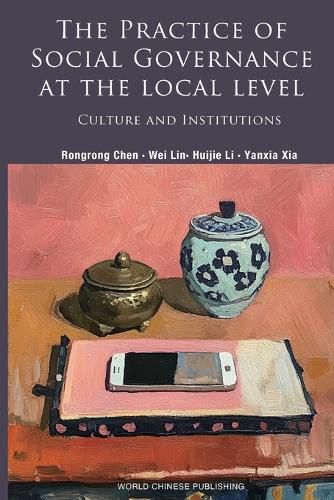Readings Newsletter
Become a Readings Member to make your shopping experience even easier.
Sign in or sign up for free!
You’re not far away from qualifying for FREE standard shipping within Australia
You’ve qualified for FREE standard shipping within Australia
The cart is loading…






This title is printed to order. This book may have been self-published. If so, we cannot guarantee the quality of the content. In the main most books will have gone through the editing process however some may not. We therefore suggest that you be aware of this before ordering this book. If in doubt check either the author or publisher’s details as we are unable to accept any returns unless they are faulty. Please contact us if you have any questions.
Primary-level social governance is fundamentally linked to societal harmony and stability and to the aspiration for a better life among the populace. It has been garnering increasing attention from all sectors of society. The 20th National Congress of the Communist Party proposed to "improve the primary-level social governance system, promote the modernization of grassroots governance, and ensure that society is both vibrant and well-ordered," highlighting that the new era's urban and rural governance system is an organic integration of self-governance, the rule of law, and moral governance. Simultaneously, as a nation with a long and rich history composed of multiple ethnic groups, China exhibits structural differences in geographical location, levels of economic development, and cultural practices. These disparities lead to the diversity and complexity of grassroots social governance, providing fertile ground for extensive research in this field. Since the mid-20th century, social governance has gradually evolved into a focal topic within academic research, encompassing multiple disciplines such as sociology, political science, anthropology, law, and management. The interplay between institutions and culture in governance practice-and its impact on the effectiveness of grassroots social governance-permeates related research across all these fields.
The rise of new institutionalism since the 1980s has repositioned institutional factors at the forefront of social science research, considering cultural elements like values, norms, and beliefs as critical variables in the formation, maintenance, and transformation of institutions. In anthropological studies, culture has consistently been viewed as an essential factor in understanding social behavior and organization. Cultural symbols and systems of meaning manifest differently across various societies, thereby shaping diverse social structures and governance models.
The book is divided into two parts: the first part explores the cultural factors influencing grassroots social governance, while the second part 2 focuses on institutional factors. Through detailed observation and analysis of practices in different regions, the book reveals the complex challenges encountered in the practice of social governance at the local level.
The cultural section comprises two studies: one examines the museum transformation of lineage culture in Bicun Village, Fujian, highlighting the reconstruction of lineage culture within modern society, while the other explores the adaptation of family ancestral halls in Southern Fujian amid the legal modernization process, revealing the tensions and interactions between lineage customs and formal legal structures.
$9.00 standard shipping within Australia
FREE standard shipping within Australia for orders over $100.00
Express & International shipping calculated at checkout
This title is printed to order. This book may have been self-published. If so, we cannot guarantee the quality of the content. In the main most books will have gone through the editing process however some may not. We therefore suggest that you be aware of this before ordering this book. If in doubt check either the author or publisher’s details as we are unable to accept any returns unless they are faulty. Please contact us if you have any questions.
Primary-level social governance is fundamentally linked to societal harmony and stability and to the aspiration for a better life among the populace. It has been garnering increasing attention from all sectors of society. The 20th National Congress of the Communist Party proposed to "improve the primary-level social governance system, promote the modernization of grassroots governance, and ensure that society is both vibrant and well-ordered," highlighting that the new era's urban and rural governance system is an organic integration of self-governance, the rule of law, and moral governance. Simultaneously, as a nation with a long and rich history composed of multiple ethnic groups, China exhibits structural differences in geographical location, levels of economic development, and cultural practices. These disparities lead to the diversity and complexity of grassroots social governance, providing fertile ground for extensive research in this field. Since the mid-20th century, social governance has gradually evolved into a focal topic within academic research, encompassing multiple disciplines such as sociology, political science, anthropology, law, and management. The interplay between institutions and culture in governance practice-and its impact on the effectiveness of grassroots social governance-permeates related research across all these fields.
The rise of new institutionalism since the 1980s has repositioned institutional factors at the forefront of social science research, considering cultural elements like values, norms, and beliefs as critical variables in the formation, maintenance, and transformation of institutions. In anthropological studies, culture has consistently been viewed as an essential factor in understanding social behavior and organization. Cultural symbols and systems of meaning manifest differently across various societies, thereby shaping diverse social structures and governance models.
The book is divided into two parts: the first part explores the cultural factors influencing grassroots social governance, while the second part 2 focuses on institutional factors. Through detailed observation and analysis of practices in different regions, the book reveals the complex challenges encountered in the practice of social governance at the local level.
The cultural section comprises two studies: one examines the museum transformation of lineage culture in Bicun Village, Fujian, highlighting the reconstruction of lineage culture within modern society, while the other explores the adaptation of family ancestral halls in Southern Fujian amid the legal modernization process, revealing the tensions and interactions between lineage customs and formal legal structures.